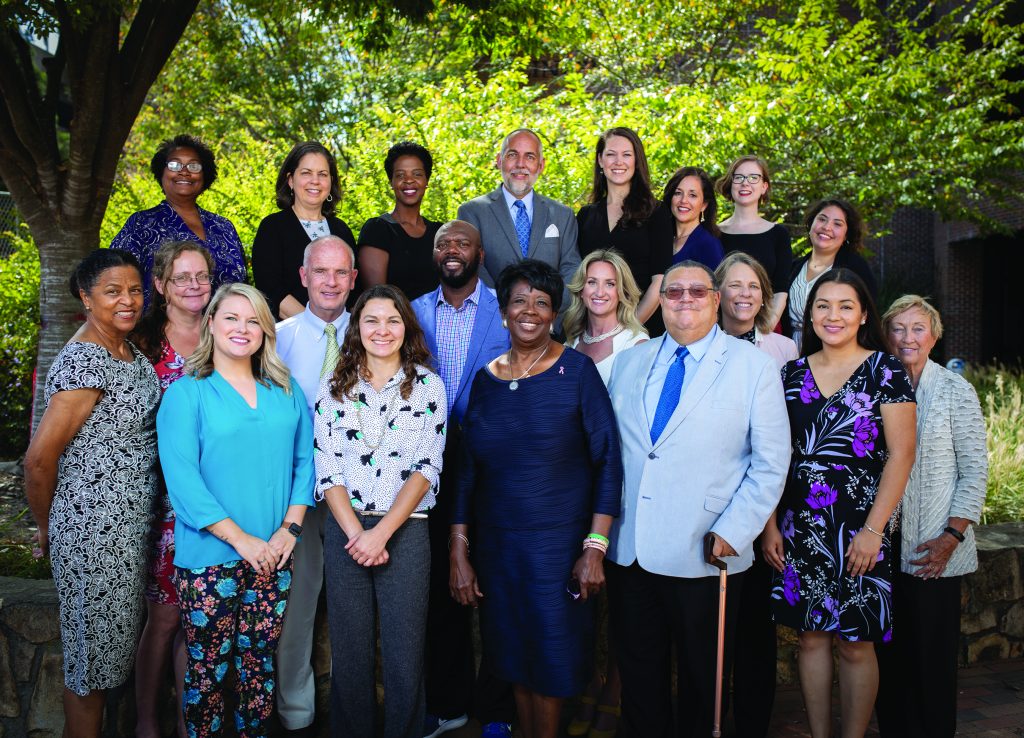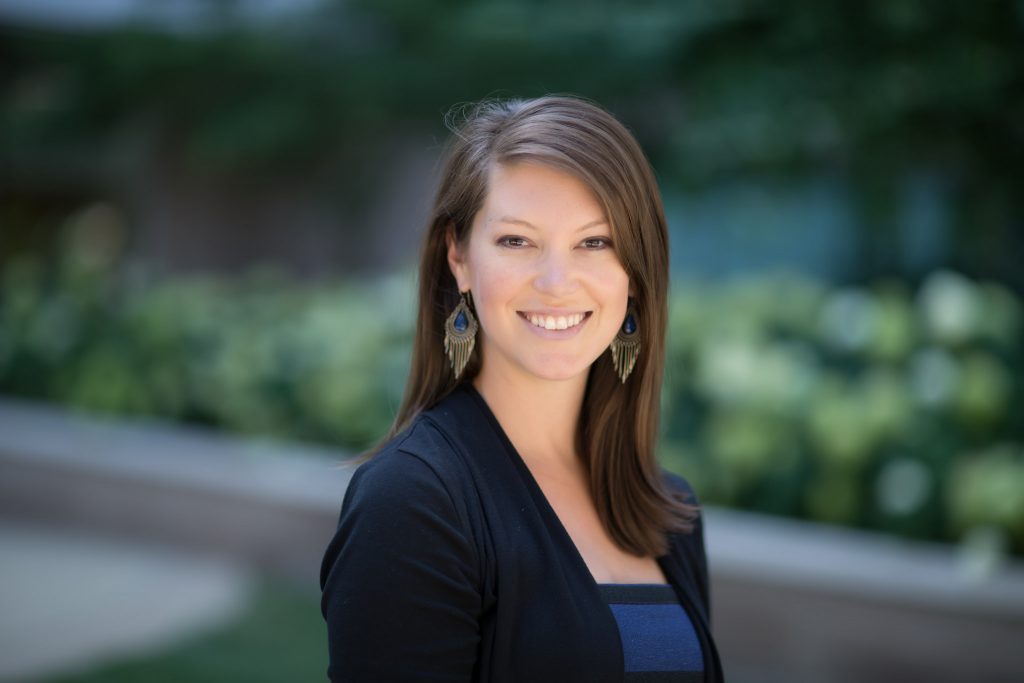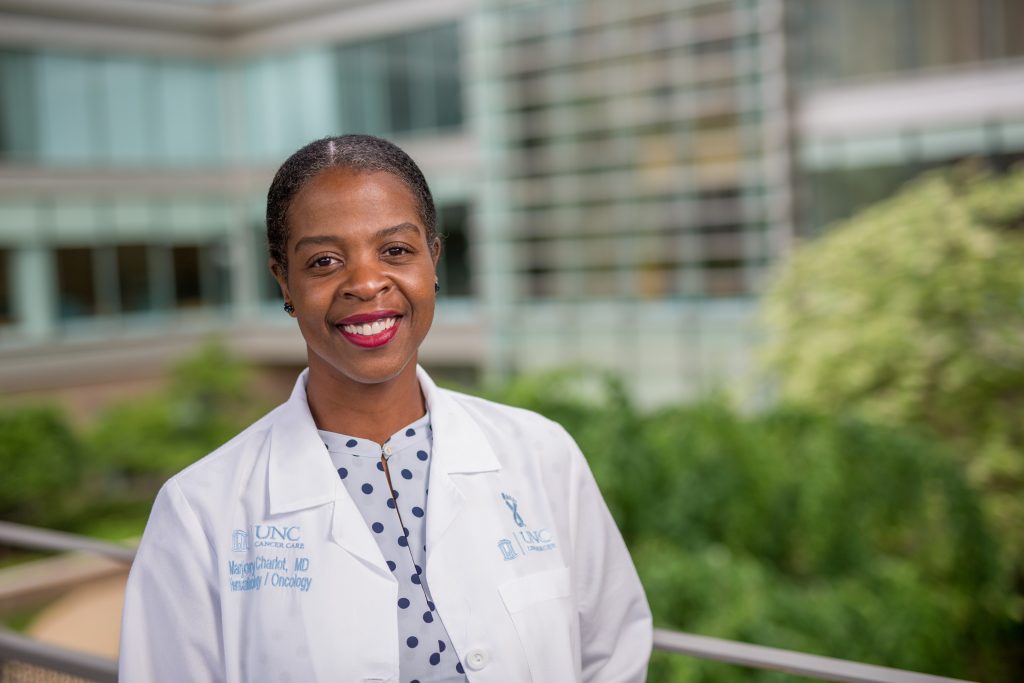They call themselves the “bridge builders” and “silo slayers.”
Whatever name they go by, the leaders of UNC Lineberger’s Office of Community Outreach and Engagement are aligned in their mission — to get the community involved in UNC Lineberger’s cancer research, care, programs and policy efforts to better understand and serve the cancer needs of North Carolinians.

UNC Lineberger launched the Office of Community Outreach and Engagement last year under the leadership of UNC Lineberger’s Stephanie Wheeler, PhD, MPH, with Barbara Alvarez Martin, MPH, and Marjory Charlot, MD, MPH, MSc, named assistant directors.
“We hope to shift the mindset at the cancer center,” Martin said. “The community has a lot to share with us, and we need to be listening.”
After embarking on a listening tour to better understand UNC Lineberger’s existing resources, the leadership team recruited a Community Advisory Board to offer direction, support and to be a bridge to the community in North Carolina.
“The board is made up of people who come from a variety of different backgrounds who are all invested in improving cancer outcomes in North Carolina,” Wheeler said.
They also recruited additional staff to form a team of 12 people to help facilitate, synergize and amplify the center’s outreach and engagement efforts.
A vision and mission for North Carolina
Together, the team developed a vision and a mission for the office that has four prongs.
First, they will monitor the state’s cancer burden and identify disparities in cancer treatment and outcomes; engage diverse stakeholders — both at UNC-Chapel Hill and across the state — in addressing and reducing the cancer burden; amplify existing outreach and supportive care efforts; and facilitate impactful cancer research in North Carolina and beyond.
Their work builds on UNC Lineberger’s long history of serving the state through clinical care, research policy and community engagement. Already, the center has research and outreach efforts in all 100 counties in North Carolina and serves patients from every county.

“We have multiple decades’ worth of history as a cancer center doing so much of this work across cancer communities,” Wheeler said. “But what we needed was more of an organizing structure to these efforts, and that’s why this office was created – to help us coordinate and bring together the researchers all across the cancer center who are doing work to serve the same mission.”
The work is particularly motivating for Wheeler, who has led multiple research projects focused on addressing the needs of underserved populations in North Carolina.
“I got involved in this effort because so much of the work that I was already doing from a research perspective was based in North Carolina communities,” she said.
Through the Carolina Cancer Screening Initiative, led by UNC Lineberger’s Daniel Reuland, MD, MPH, Wheeler worked to boost colorectal cancer screening in underserved areas of the state.
“This is the guiding principle of what our Community Outreach and Engagement office is intended to do – to promote cancer-related research and clinical efforts across the entire state with an emphasis on reducing morbidity and mortality in medically underserved populations where we see a disproportionate burden of cancer,” she said.
Community outreach projects
UNC Lineberger researchers have launched other projects to address the state’s cancer burden and reduce disparities in outcomes. They are focused on building partnerships with community organizations and other institutions to fulfill their mission.
“We want to amplify what is already going on, and create synergies by connecting researchers and clinicians to broader audiences,” Martin said.
ACCURE study
ACCURE, or Accountability for Cancer Care through Undoing Racism, is a multi-faceted intervention developed with the Greensboro Health Disparities Collaborative, to ensure patients completed treatment for early stage breast and lung cancer.
Results of the ACCURE study led by UNC Lineberger’s Samuel Cykert, MD, showed this effort eliminated disparities in treatment completion rates between white and black patients over the course of the study.
The principal investigator of the study, Cykert said the effort eliminated a 9 percent gap in treatment completion between white and black patients over the course of the study.
Trimming Risk in Men
Trimming Risk in Men, led by UNC Lineberger’s Laura Linnan, ScD, used barbershops in North Carolina as a platform to educate men about prostate cancer and colorectal cancer risk as part of an effort to address disparities for black men.
Martin said a critical reason these studies succeeded was because they partnered with the communities they served.
“Lineberger is such a valued resource in this state,” she said. “It’s important for us to remember that community partners also have a lot to offer the cancer center. The benefits flow in both directions. If we’re looking for innovative ways of to reduce cancer outcomes, let’s look to the community for ideas and inspiration. They are the ones we are serving.”
Reducing disparities
Charlot, COE co-director and medical oncologist who treats patients with lung cancer, is leading an ongoing initiative to address under-representation of African-American cancer patients in clinical trials.

While people identifying as African-American represent 22 percent of the population in North Carolina, 18 percent of people recruited to interventional treatment trials at UNC identified as African-American.
The project is an example of the center’s work to reduce cancer-related disparities in North Carolina.
“One of our goals for the Community Outreach and Engagement Office is to ensure that the representation of our patients on clinical trials mirrors the demographics of North Carolina,” Charlot said.
Supported by the V Foundation for Cancer Research, the program will use a patient navigator to provide an extra layer of support for African-American patients and people of low socioeconomic status as they consider clinical trials.
“We are providing education to providers and research teams about the importance of ensuring equitable access to clinical trials while also trying to reduce any barriers that could be there for trial participation, such as lack of awareness of available trials, transportation, lodging or time,” Charlot said. “This is important work, as participation in clinical trials demonstrates access to high-quality cancer care.”
